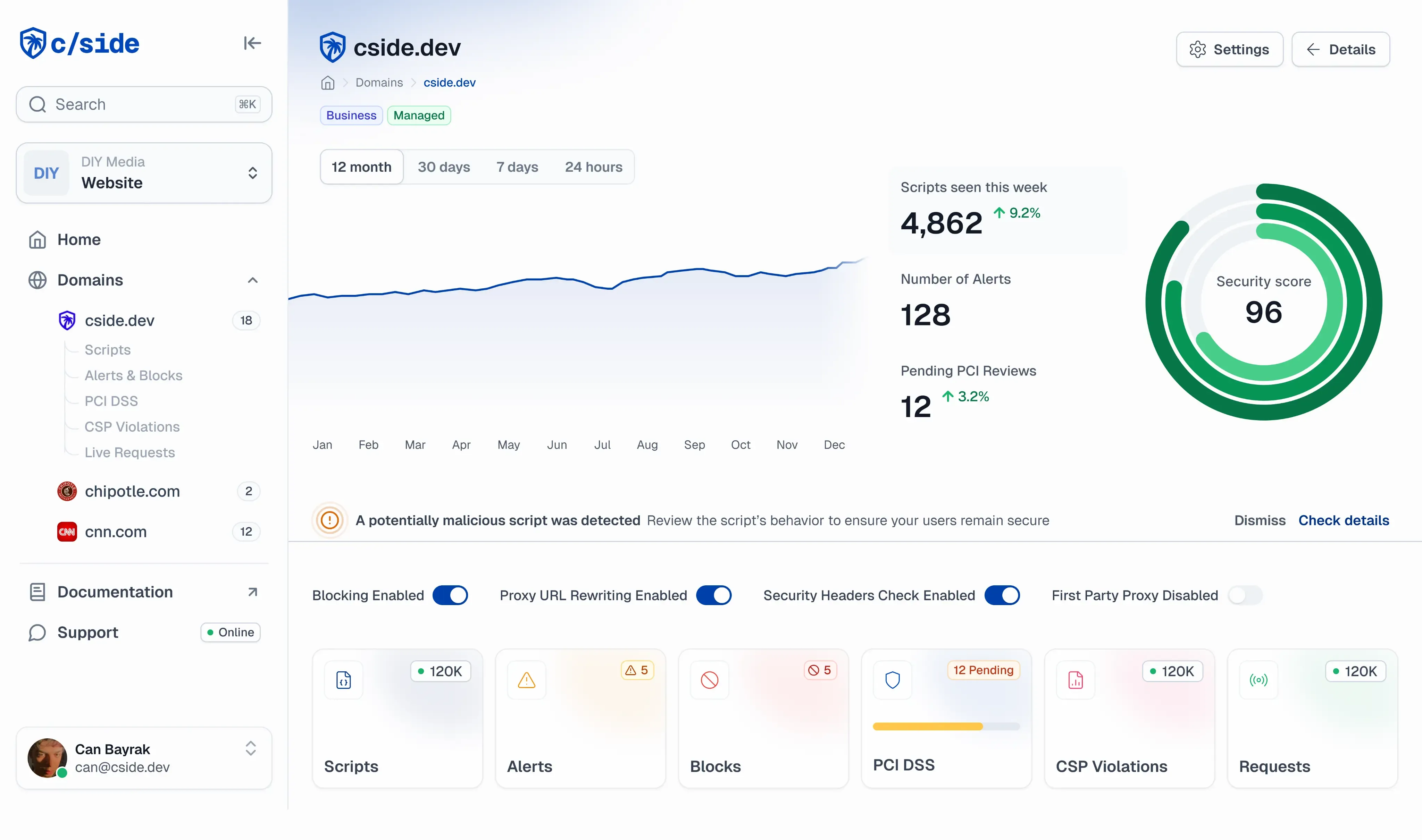California Privacy (CCPA/CPRA) Compliance Made Simple
Keeping consumer information safe client-side

Keeping consumer information safe client-side

The California Consumer Privacy Act (CCPA/CPRA) gives California residents control over their data. They can see, delete, or fix their personal information, and stop companies from selling or sharing it. The browser-based Global Privacy Control (GPC) automatically signals opt-out preferences that companies must honor.
Because cookies, tags, tracking and data sharing all happen in the browser, server-side security alone doesn't cut it. cside gives you client-side visibility and control and adds audit-ready evidence on top.
Like the EU's GDPR, California's privacy law (CCPA/CPRA) gives people real control over their digital footprint. CCPA defines two types of data. Personal information (PI) is any data linked to a person or household. Sensitive personal Information (SPI) includes exact geolocation, government IDs, financial and login data, genetic data, health records, ethnicity, religion, union membership, and private messages. Minors get extra protection: opt-in required under 16 and parental consent under 13.
That puts real responsibility on companies. They must be transparent about data collection and avoid over-collection. When people opt-out or use privacy controls, companies must respect that without discrimination. If not, regulators can impose penalties of $2,500 per violation, or up to $7,500 for intentional violations or those involving minors; and people can sue for certain breaches.
Client-side data collectors, pixels, tag-manager injections, SDKs, session-replay, widget, run in the browser before your server even sees them. cside enforces security right where tracking happens. It blocks non-compliant code before it can run and monitors data flows in real time. You get detailed audit-ready logs to prove compliance for data collection and minimization, non-discrimination reviews and rights requests, including automatic opt-out signals (GPC).
Honors opt-out of data selling and sharing and GPC before load. cside allows only approved service-provider traffic and blocks all other scripts, ad tags etc. before execution, with detailed logs for proof.
§1798.120, §1798.135, 11 CCR §7025–§7026
cside captures exportable, time-stamped request-level logs, destination maps, and a script inventory. You see which scripts run, the fields they touch and where data goes. It gives 24/7 proof that opt-outs were honored and requests answered.
§1798.100(a), 11 CCR §7101
cside helps ensure you collect only proportionate and necessary data. It limits use or disclosure of sensitive personal information (SPI) and blocks exfiltration of cookies and form data to unexpected endpoints.
§1798.100(c), §1798.121
Data flows only to approved service-providers under proper contracts. Third-party advertising gets blocked when people opt out. cside shows evidence that choices were honored without discrimination.
§1798.100(d), §1798.125, 11 CCR §7051
Catch exfiltration attempts, e.g. formjacking, in real time. cside encrypts in transit (TLS) as appropriate to risk, detects and blocks risky scripts pre-execution, and provides forensic logs to support investigations and reviews.
§1798.100(e) & §1798.81.5
A California resident has Global Privacy Control (GPC) enabled. In the background, ad tags still fire and capture purchase data for advertising, a CCPA violation.
With cside, GPC is honored automatically: cside blocks the tags before they run. The event is logged, with script version, touched fields and endpoint.
Result: no unauthorized sale or sharing of personal information, plus a complete audit-ready proof that the opt-out was honored. All in line with the goal of CCPA: giving consumers control over the data companies collect.
Leading companies trust cside


















Built for security teams who need visibility inside the browser, cside delivers proven defense against modern client-side attacks while supporting major compliance frameworks. Your trusted partner for regulatory compliance in the browser.
Visit our Trust Center GDPR
GDPR  SOC 2
SOC 2  PCI DSS
PCI DSS Start monitoring and securing your website's client-side environment today. Comply with CCPA/CPRA requirements and protect consumer privacy.
*This page describes product capabilities and how they may support your compliance program. It is not legal advice. Requirements vary by organization and jurisdiction.